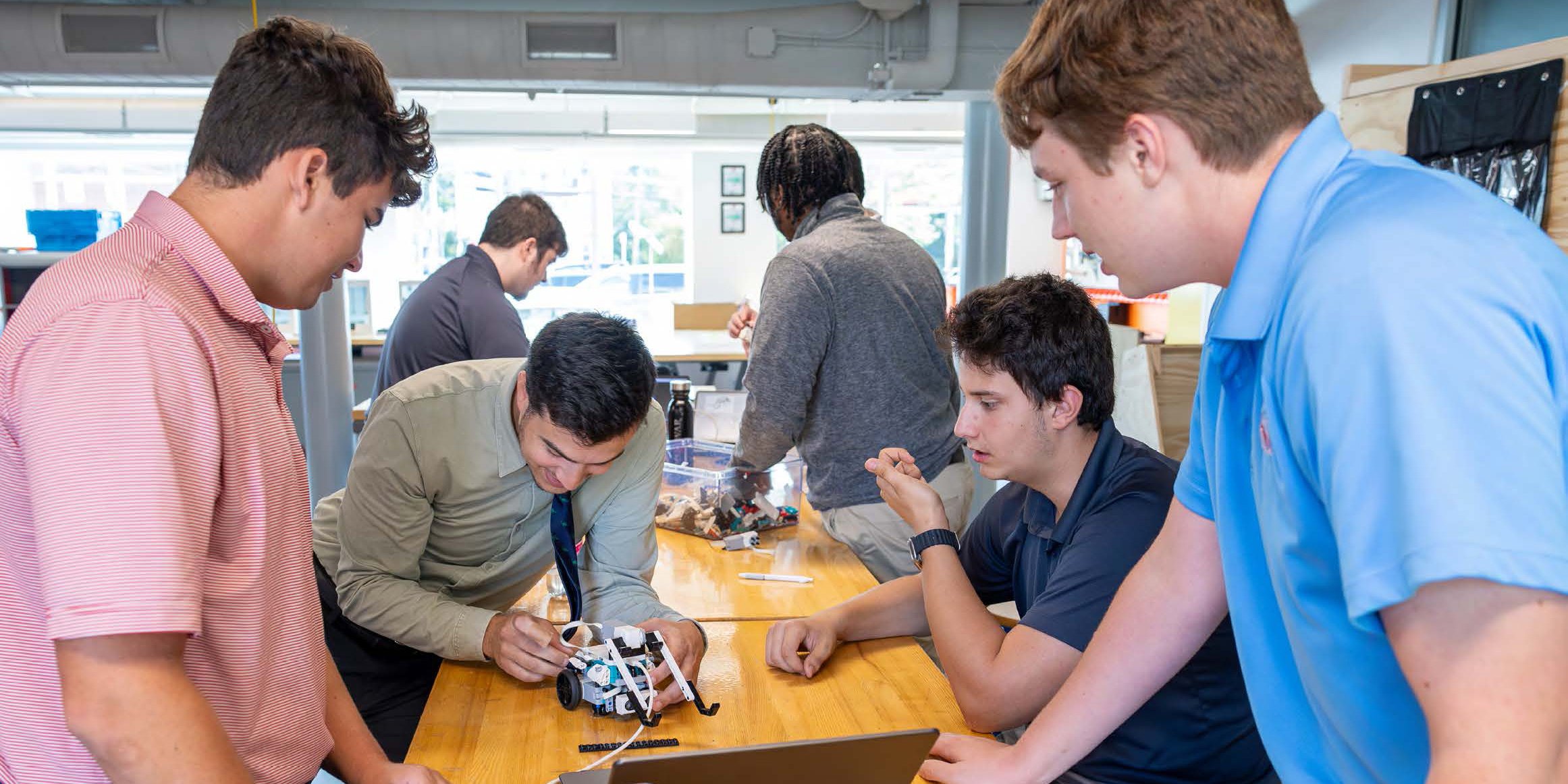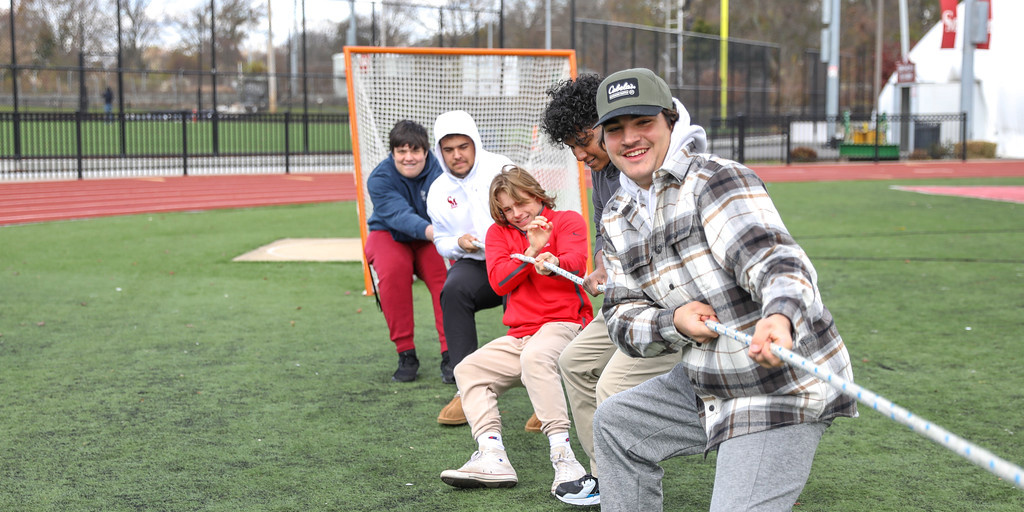Winning Ways
In a historic year, the champions of CM showed us that the ideals of poise and class remain as strong as ever.
On a negative degree December night at Gillette Stadium, the football team stormed the field to celebrate its third MIAA Division 2 Super Bowl Championship in four years. In March, on Saint Patrick’s Day weekend at TD Garden, the hockey team mobbed Tommy Hurst ’25 after his goal clinched the Division 1 Championship with only 21 seconds to play. Weeks later, the school fight song rang through the halls of Walpole High School as the speech and debate team secured its sixth consecutive state championship.
Three team state titles—plus individual championships in swimming and track and field— would mark a historic year at most schools. At Catholic Memorial, it continues a tradition built on the belief that while trophies matter, how they’re won matters more.
Upon his arrival in 1961, Jack O’Connor, CM’s second athletic director and first football coach, established the idea of “poise and class.” Speaking with his heart and soul behind his words, along with a disarming smile, O’Connor stressed that while he enjoyed the victories and high achievements, they had to be earned the right way “To win with poise and class means you respect the work, you respect your opponents, and you never make a fool of yourself,” says Jack Holland ’25, football captain and a member of the vaunted speech and debate team. “You celebrate your achievements, not someone else’s failures.”
Holland is what assistant speech and debate coach, Ryan Julian ’18, terms as a “CM Iron Man,” a person who goes above and beyond what he is asked. When the 2:30 p.m. bell rings to end the school day, Holland heads to the Walsh Fiel d House to lift weights with his football teammates. When practice ends around 6:00 p.m., he makes his way to Brother Anthony Cavet’s classroom, where he and his duo partner, Donovan Burke ’26, also a football player, rehearse their piece, sometimes staying on campus until 9:00 p.m.
d House to lift weights with his football teammates. When practice ends around 6:00 p.m., he makes his way to Brother Anthony Cavet’s classroom, where he and his duo partner, Donovan Burke ’26, also a football player, rehearse their piece, sometimes staying on campus until 9:00 p.m.
As a center on the football team’s offensive line, Holland plays a position that is known for unsung work and quiet leaders. But ask anyone who sees the hours he puts in, and they’ll tell you—he sets the tone.
“Jack is a guy who will do whatever is asked of him for the team to be successful, and he’ll nail the performance,” says Julian. “He has an incredible work ethic. I can’t mention how many times we’ve stayed late and practiced until we’re the last people in the building.”
During speech and debate competitions, seniors like Holland act as de facto assistant coaches. In between competition rounds, they spend time helping younger teammates hit that sweet spot with their pieces. It is an expectation of a school and program that calls on their leaders to pull younger classmates up and help them score points during contests – encouraging them to become leaders themselves. There is a self-generating aspect to this coaching method, and it works.
“We benefit because we have seniors who encourage their teammates, some of whom are performing pieces that they did themselves. So, we have mentorships where a senior says to a freshman, ‘I’ve done this speech, I’m going to help you do this speech,’” says Julian.
Being part of a team doesn’t mean you show up for practice, leave two hours later, and play two or three games a week. What happens in the hallways in between classes is just as important as what happens during team activities. It’s why hockey head coach Larry Rooney P’19 stands across from campus ministry, each morning and in between periods. It’s a regular sight to see Rooney greeting members of the hockey program, asking them how their day is going, and making sure that his players are staying on top of their academic studies.
“A big part of standing in that spot is making connections away from the rink,” says Rooney. “That’s an important part of this community. As a coach and administrator, I want to see how these kids are behaving. We just don’t throw those quotes about character matters and poise and class; we live it every day.”
His emphasis on creating a culture of accountability is why Rooney has a vested interest in seeing how his team behaves in between class periods and in the Kennedy Commons. The way a player acts in the classroom is an important indicator of how someone will react to the more challenging parts of a season.
You can be a talented winger, but if it’s noted that you have a poor attitude during the school day or are not serious about completing schoolwork, the lackadaisical attitude on display will likely impact the team for the worse.
On the ice, seniors like Lincoln Hennessy, Morgan Lenehan, Luke Long, Cam Reed, and Seamus Tattan keep the team accountable. Following a 2-1 win over Arlington Catholic in the second round of the tournament, the seniors made it  clear their effort wasn’t good enough, and a higher level of focus was needed.
clear their effort wasn’t good enough, and a higher level of focus was needed.
The seniors again stepped up in the state final when Saint John’s High School took a 3-2 lead in the third period. During a delay in play, they calmed the bench down, reassuring their teammates that they could regain control of the game.
“We’ve had teams in the past with more talent. But championships aren’t about what’s on paper. They’re about chemistry, leadership, and how a team handles the moments that test them,” says Rooney. “If we commit to the process and focus on development of the team and the individual, the wins will come.”
In a 2011 interview, O’Connor mentioned that poise and class had taken a new name, “one game at a time.” Teams always have end-of-the-year goals, but ignoring the short-term objectives often guarantees disappointment.
It’s why the football team focuses on the week ahead rather than the state championship. As coach John DiBiaso tells them, the most important game is the next game on the schedule. To look past a team or to assume that a Super Bowl appearance is a given risks firing up the next opponent and causing them to see the oversight as a sign of disrespect.
And when those wins happen, there is little time to celebrate. The number of rushing yards or tackles is irrelevant. The morning after a win, it’s back to lifting and game film review.
“Ultimately, the end goal is to win it all. While other teams might celebrate getting the number two or three in the power rankings, our goal is to get the one seed and win the championship. It’s not a knock on anyone – it just reflects the higher standard we hold ourselves to,” says Jack Holland.
The no-nonsense attitude was made clear moments after their Elite Eight win over Bridgewater-Raynham. While other teams posted photos of themselves on social media celebrating their advancement to the Final Four, DiBiaso held up the trophy awarded to all state semi-finalists to only make one clear point: this season’s goal had not been achieved.
“Do you know what we do with these? We chuck them! This is not the trophy we play for,” DiBiaso told his team. “We only play for championship trophies.”
As quarterback Kise Flannery ’26 puts it, “You either win it all or you win nothing. That is the standard."

This summer, CM will raise three new banners in the Perry Gymnasium - recognizing our sixth football state championship, 18th hockey title, and eighth Speech & Debate victory. These achievements weren’t handed out—they were earned through seniors guiding freshmen, teammates supporting each other beyond the rink, and a football team that stayed grounded, focused on the little things that build to something big.
Most importantly, they were won with poise and class, celebrating the effort behind the success, not the setbacks of others.
“We have to act like we’ve been there before because we’ve been there before,” says Holland. “We have to show respect for the work we did because if we start acting like jerks and putting people down, all the work we put into winning that championship is no longer recognizable.”



